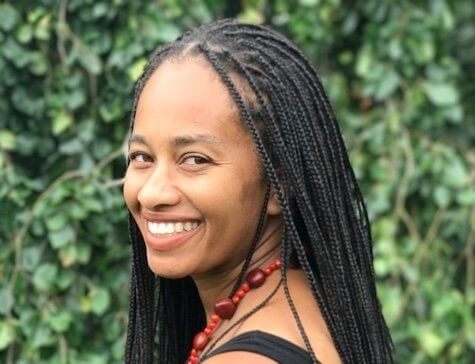PRESS RELEASES | May 13, 2019
A Conversation with ACP Decisions Co-Founder & CEO
Reading Time: 5 minutes

As a pioneering organization established to empower patients and their families to engage in shared decision making with their healthcare providers, ACP Decisions is a leader in the creation and dissemination of video-based decision aids in the advance care planning space. In the following Q&A, ACP Decisions Co-Founder & CEO Aretha Delight Davis, MD, JD shares her personal journey to co-founding the organization and her thoughts on how the videos help patients and families find their voice.
Question: You were an attorney before you went back to school to get your medical degree. What made you decide to become a physician?
Aretha: When I was growing up, some of the people I admired most were physicians; but in college I became interested in social justice and advocacy and decided to go to law school. After law school, I worked in the corporate criminal defense practice at a large law firm – the work was intellectually satiating, and I enjoyed and respected the people that I had an opportunity to work with.
One day as I was sitting in my office, I received a call from my father, out of the blue, saying that he needed to fax me something, and what I learned shortly thereafter, was a turning point that really changed the trajectory of my life. His fax was a PET scan image and there were medical findings at the bottom of the page. Much of it did not make much sense to me at the time, but that was how I came to realize that my father was dying of cancer.
I was not prepared emotionally for this news. My parents had actually hidden his health condition from me. He had been diagnosed with metastatic prostate cancer many years prior, but my parents had not disclosed his health condition to me. When I went to medical school, I came to appreciate the nature of his ongoing back pain, but at the time I didn’t.
Question: How did that affect you personally?
Aretha: I look back on that day as when my internal gyroscope began to wildly spin and tilt – I began to think seriously about my place in the world and my purpose. Growing up in a very religious home and being a spiritual person, I wrestled with how I was going to use my talents and gifts and make the best use of the educational opportunities I had been given.
When I became a caregiver for my father, I began to fully appreciate just how difficult it is to navigate our healthcare system as a patient. I also realized how hard it is to feel in control and to feel like your wishes and preferences are honored when you are seriously ill.
That realization led me to have a weird sense of failure. Here I was, successful at my law firm, and I’m asking myself, “Isn’t this success? Isn’t this what people want? Isn’t this what I have worked so hard for?” One of the partners in my firm offered me a life-changing insight: “Aretha, I always knew this about you, that your sun neither rose nor set on making partner here. You came here for a time, and your heart is going to take you elsewhere so you can use these skills and do something bigger and better.”
So, I literally left corporate law on a Friday, and the following Monday, I was in a pre-med program. I felt that I could bring a unique perspective to medicine: being a caregiver had informed my viewpoint and was the source of my empathy. As a lawyer, I had learned how to communicate complicated ideas and concepts in a simple and understandable way – and this is not necessarily a skill that all clinicians are very good at, frankly.
Question: How do you envision your role and mission within healthcare?
Aretha: For me, it’s about justice – social justice. One of my heroes is Bryan Stevenson, a brilliant lawyer who founded the Equal Justice Initiative (EJI). EJI represents the poor and people who have been wrongly condemned of crimes. In law school, I remember him talking about justice as not only something that gets meted out in a court of law, but also as a force for good in any human endeavor.
That’s where I see ACP Decision’s role because our videos help empower people. I believe they help them find their voice, and that discovery is at the core of my call to medicine. And ultimately, that’s our mission within healthcare.
With ACP Decisions, we are trying to be catalysts for a movement within medicine that is led by patients and their families. We try to provide people with information about important and sometimes daunting topics in a way that is easily understood. That information is presented without judgment, meets people where they are, is values-neutral and evidence-based and in their language of choice. And we hope ultimately enables them to become the center of, and in control of, their healthcare.
Question: What role do ACP Decisions’ videos play when it comes to advance care planning?
Aretha: The videos help address the phenomenon that some refer to as “information asymmetry.” On the one hand, clinicians have a lot of medical information within their grasp. That’s why they go through all that schooling and training. And knowledge, to a certain degree, is power.
On the other hand, there are people like my father or like me before I became a physician, who don’t have access to that type of information. Patients and their loved ones are experts about what their values are and what’s important to them, but they can struggle to understand some of the science of medicine and the pathophysiology involved.
These videos validate that patients’ values and beliefs matter and that what they have to say about the healthcare that they receive is important. The videos can help transform the role they’re playing in their own healthcare by helping to level the playing field. They can come to their healthcare team knowing “You may know the science, but I’m an expert, too. And by the way, this is my body. I’m the owner of this instrument, and I have the expertise in terms of what matters most to me.”
Question: What differentiates ACP Decisions’ videos from other health education videos?
Well, certainly in the advance care planning space, the first differentiation is the evidence-based nature of our work. Currently, there are about 20 clinical trials demonstrating the efficacy and effectiveness of using these videos in clinical practice.
Also, when we create these videos, as part of the development process, we always are very sensitive to health literacy issues. The videos are deliberately composed in a way that ordinary people can understand, people like my father.
We are also sensitive to patients who prefer a language other than English. We don’t just take an English script and translate it into another language using a transcription program. The videos go through a “transcreation” process so that when someone from that patient population sees it, they don’t feel like they were an afterthought. We want people, whether they are Haitian Creole speaking, or Arabic speaking, or if they communicate via American Sign Language, to see our videos and automatically feel confident knowing that it was made with them foremost in mind. The videos were created to serve them — they were the primary thought, not an afterthought.
Question: What do you consider to be the greatest accomplishment of ACP Decisions so far?
Aretha: What I’m most proud of is our ability to grow as an organization, whether you talk about growth in terms of the expansion of our video library, or the development of our delivery platform, or in terms of revenue, while remaining true to our mission and to what’s important to us. That’s probably our greatest accomplishment.
There are easier ways to grow. There are shortcuts, but we have been truly fortunate and blessed to be able to do this work, while remaining passionate and true to who we are. And on some level, I’d like to think that gets communicated in our work as well.
ACP Decisions creates evidence-based video decision support tools that promote effective advance care planning and are easily accessible on a user-friendly technology platform. Find more resources and information by visiting our blog. If you’d like to learn more about implementing an advance care planning initiative in your organization, contact us today.
You might also like...

U.S. News article on Solo Aging cites ACP ...
PRESS RELEASES | < 1 MIN READ


